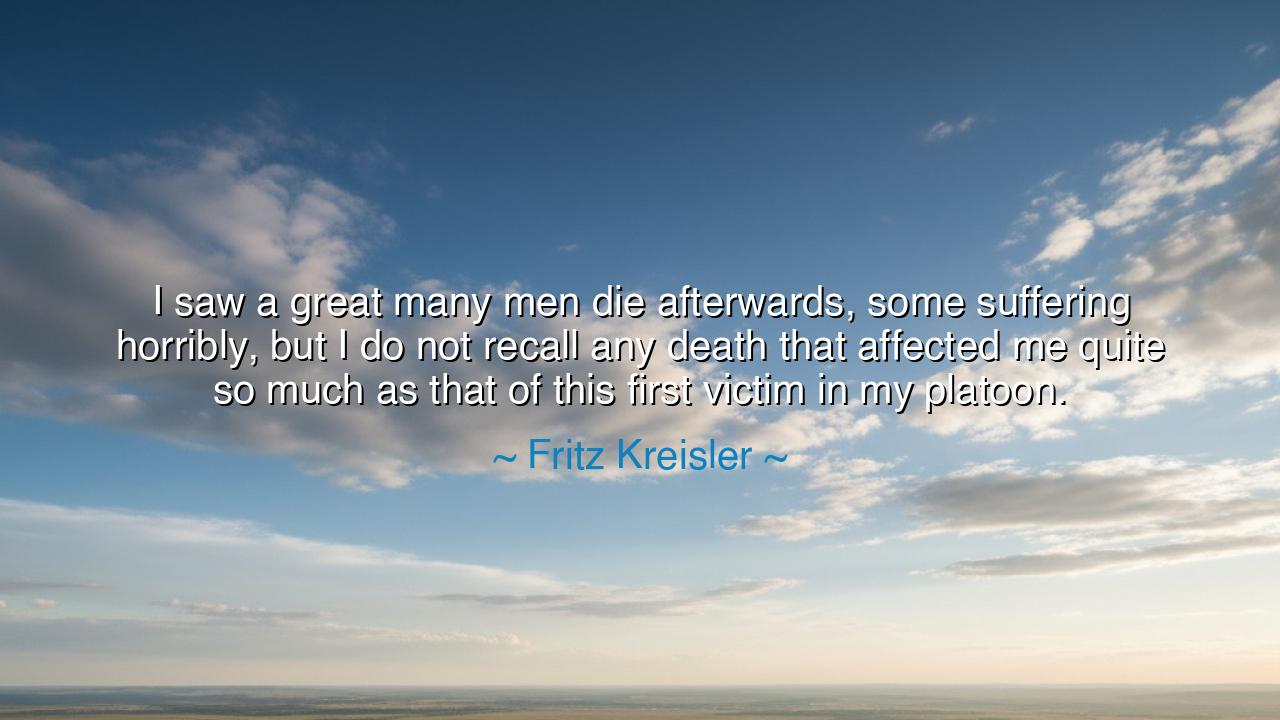
I saw a great many men die afterwards, some suffering horribly
I saw a great many men die afterwards, some suffering horribly, but I do not recall any death that affected me quite so much as that of this first victim in my platoon.






"I saw a great many men die afterwards, some suffering horribly, but I do not recall any death that affected me quite so much as that of this first victim in my platoon." Thus spoke Fritz Kreisler, the great violinist and soldier, whose music once sang of beauty but whose memory was forever shadowed by war. In these words, we hear not only the lament of one man, but the cry of all who have looked upon death and felt the innocence of their hearts slip away. For Kreisler’s confession reveals a truth that dwells deep within the soul: that the first encounter with death—especially that of a comrade—is a wound that never heals. It marks the boundary between the unscarred world of youth and the sorrowful wisdom of experience.
Fritz Kreisler was not born for war, but for art. A prodigy of the violin, he had filled concert halls with melodies that lifted the human spirit beyond sorrow. Yet when duty called, he served as an officer in the Austro-Hungarian Army during the First World War, and there he faced the brutal discord that no symphony could silence. In the trenches, amidst mud and thunder, he witnessed the fragility of life stripped bare. The “first victim in his platoon” was not merely a soldier who fell—it was the death of innocence itself. Before that moment, death was an idea; afterward, it was a face, a name, a stillness where there had been laughter.
In this, Kreisler’s words mirror the experience of countless soldiers before and after him. The ancients too understood this transformation. The Roman poet Virgil, in his Aeneid, wrote of the young warrior Pallas, struck down before his time. The grief of Aeneas, his commander, was not only for the youth he lost but for the shattering of his own belief in glory. “So ends the faith of battle,” he seemed to say, “when the first beloved friend lies fallen.” Kreisler, like Aeneas, learned that heroism is not found in the killing, but in the enduring of loss—the endurance that demands one continue living while carrying the weight of the dead.
The reason this first death affects the soul so deeply is because it is the moment one realizes the full cost of human mortality. The first time one sees a life extinguished, all illusions vanish—the illusion of control, of safety, of permanence. The young officer becomes old in a heartbeat. He learns that courage is not the absence of fear, but the resolve to face the unbearable. Later deaths, though perhaps more horrific, can never wound the heart in quite the same way, for the first sorrow has already broken it open. The soul grows calloused in self-defense, and yet, the memory of that first loss remains—a single flame that flickers forever in the darkness of remembrance.
In truth, Kreisler’s grief speaks not only to the soldier but to every human being who has suffered the first great loss of life or love. For all of us, there comes a moment when the veil of comfort is torn, and we look directly into the face of suffering. The first friend who dies, the first heartbreak, the first injustice witnessed—these moments mark the birth of compassion. The one who has suffered learns to see the pain of others, and in that seeing, the heart deepens. Kreisler’s sorrow, then, is not despair—it is awakening. In the breaking of his heart, he discovered the true music of humanity: the music of empathy.
Consider the life of Florence Nightingale, who, during the Crimean War, tended to the wounded and dying by candlelight. She too saw many perish, yet she wrote that it was the first death she witnessed that transformed her forever. From that moment on, she could not rest until she had changed the conditions that condemned so many to needless suffering. Like Kreisler, she found in the pain of loss a lifelong calling—a sacred duty to honor the fallen by lifting the living. Such is the alchemy of sorrow: it refines the spirit until grief becomes service, and heartbreak becomes love.
So, my listener, take this teaching to heart: do not fear the pain of the first loss, for it is the teacher that shapes your soul. When you encounter death, or the death of something dear, do not harden yourself against it. Let it humble you, let it deepen you. For though the first wound may ache forever, it is through that very ache that wisdom is born. The one who refuses to forget learns to cherish life more fiercely, to love more tenderly, to stand more bravely in the face of suffering.
And remember the final truth within Fritz Kreisler’s lament: the world is filled with endings, yet from each ending, a song can rise. He who has seen death and still chooses to create beauty defies the void itself. So when your turn comes to bear loss, do not let despair silence you. Turn your grief into melody, your sorrow into compassion. For in this way, you honor the fallen—not only with tears, but with the music of the living heart.






AAdministratorAdministrator
Welcome, honored guests. Please leave a comment, we will respond soon